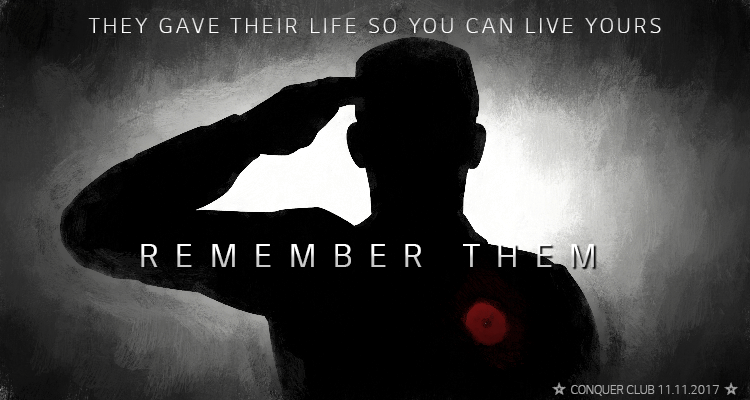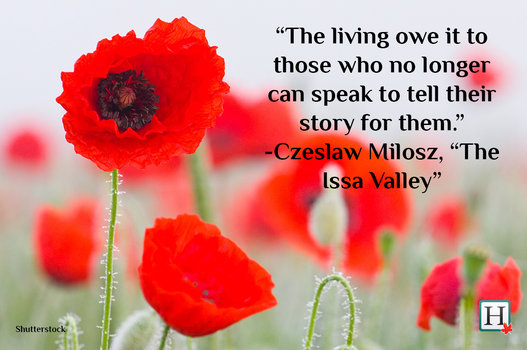
[spoiler=Remembrance Day - Canada]
[/spoiler]Veterans Affairs Canada wrote:Every year on November 11, Canadians pause in a silent moment of remembrance for the men and women who have served, and continue to serve our country during times of war, conflict and peace. We honour those who fought for Canada in the First World War (1914-1918), the Second World War (1939-1945), and the Korean War (1950-1953), as well as those who have served since then. More than 2.3 million Canadians have served our country in this way, and more than 118,000 have died. They gave their lives and their futures so that we may live in peace.
[spoiler=Veterans Day - United States]
[/spoiler]Military.com wrote:This holiday started as a day to reflect upon the heroism of those who died in our country's service and was originally called Armistice Day. It fell on Nov. 11 because that is the anniversary of the signing of the Armistice that ended World War I. However, in 1954, the holiday was changed to "Veterans Day" in order to account for all veterans in all wars.
We celebrate and honor America's veterans for their patriotism, love of country and willingness to serve and sacrifice for the common good.
Chrissie Reilly wrote:ABERDEEN PROVING GROUND, Md. (Nov. 9, 2012) -- World War I happened nearly a century ago in Europe. Frank Buckles, the last living American WWI Veteran, died last year at the age of 110. It was the sacrifice of he and of his fellow service members that inspired the holiday Americans are about to observe: Veterans Day.
Originally known as Armistice Day to honor the living veterans of the First World War, Veterans Day has transformed into a holiday inclusive of service members of all eras. Veterans Day is a national holiday of remembrance and recognition of all those who served regardless of branch or duty status, Reserve or active component.
Looking back on Veterans Day as Armistice Day is at once nostalgic as well as historically mindful. Historian Robert H. Ferrell of Indiana University Bloomington reminds readers that what was once a staple celebration represented by World War I era artifacts and culture was translated into a holiday that could span generations. In his work, "Oatmeal and Coffee: Memoirs of a Hoosier Soldier in World War I," Ferrell outlines those Great War Soldiers were a very different breed than their World War II counterparts. Doughboys, as World War I Soldiers were called, were not the same as the Yanks or G.I.s of World War II.
ARMISTICE DAY
An armistice, or temporary cease fire, between the Allied Nations and Germany stopped the fighting of World War I on November 11, 1918. Known at the time as the Great War, the end of combat became effective on the eleventh minute of the eleventh hour of the eleventh day of the eleventh month. The official end of the war would not come for another seven months, on June 28, 1919, when the Treaty of Versailles was signed. A publication from 1918, America Magazine, marked the day as one of triumph and joy, even amongst those suffering from losses. A passage from this magazine read: "There would be time and enough in the future to grieve for the ravages was had wrought in their own lives, but on the day of the armistice all gave way to universal rejoicing, because mankind was once more free."
President Woodrow Wilson proclaimed the first "Armistice Day" on Nov. 11, 1919, to show solemn pride in the heroism of those who died in the country's service. Wilson declared "To us in America, the reflections of Armistice Day will be filled with solemn pride in the heroism of those who died in the country's service." The original concept for the celebration was for the suspension of business for a two minute period beginning at 11 a.m., with the day also marked by parades and public meetings.
In 1920, France and the United Kingdom each held ceremonies honoring their unknown dead from the war. An "unknown soldier" of the Great War was buried in each nation's highest place of honor: in England, Westminster Abbey; in France, the Arc de Triomphe. This holiday is now known as Remembrance Day in Canada, the United Kingdom, France, and Belgium, and commemorates all who served.
In 1921, an unknown American Soldier was interred at Arlington National Cemetery in Arlington, Va. Armistice Day officially received its name in America in 1926 through a Congressional Resolution (44 Stat. 1982). This proclamation read: "It is fitting that the recurring anniversary of this date should be commemorated to perpetuate peace through good will and mutual understanding between nations."
Sources: Veterans Affairs Canada, Military.com, History.com, Smithsonian, Pritzker Military, Army.mil

2015 "In Flanders Fields" Poetry Event
What we would now like to do is open this thread for both veterans and their families, from all countries, to post any personal accounts and stories of previous wars passed through the generations for the CC community to read and appreciate what our veterans and their families have done for us through the years.





](./images/smilies/eusa_wall.gif)